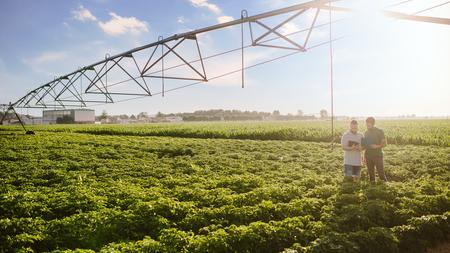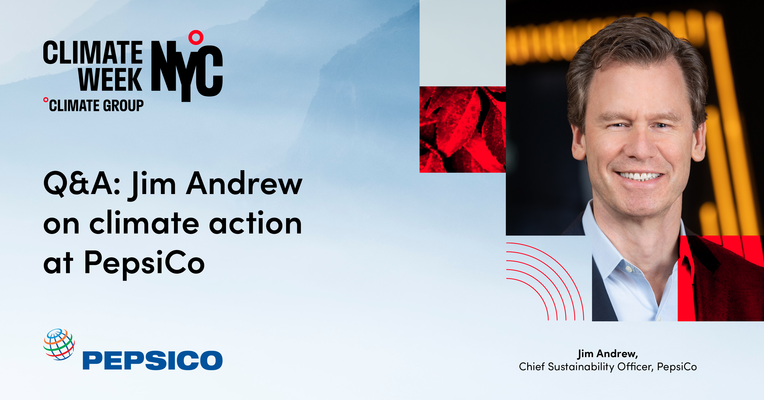Ahead of Climate Week NYC, we spoke with Jim Andrew, Chief Sustainability Officer, PepsiCo for a Q&A around sustainable practices:
Whilst many organizations have made climate commitments, we need to see action now. What have/are you doing to reduce your emissions in the short-term?
Taking action to address climate change is a business imperative for PepsiCo, and it’s also the right thing to do for the planet. We’re taking that action right now and seeing an impact in 2023. Leveraging science and technology, we’ve increased the use of electric vehicles across our company fleet, improved energy efficiency and applied renewable energy solutions in our operations. And we’ve taken innovative approaches to decarbonize by, for example, converting potato peels and used cooking oil to energy that can provide some of the power for our plants or supply fuel for trucks. Where effective, these innovations can become the building blocks for scaling impact. Since launching PepsiCo Positive (pep+) in 2021 – a strategic transformation that puts sustainability at the heart of everything we do – we’ve also been building the foundation for longer term progress, with global and local investments and strategic partnerships, to help us achieve our ambition to be net zero by 2040.

What are the main challenges you face in implementing climate-related initiatives? How are you addressing them?
Growing a business while reducing emissions is a challenge for us and many organizations. Turning the tide will take persistence, creativity, and time, but we are putting substantial action and investment behind reducing emissions and building resilience.
The three main contributors to our carbon emissions footprint are agriculture, packaging, and transport and distribution. We are focusing our climate strategy on these areas, as well as a few others, including manufacturing and vending and cooling equipment, where we can have the biggest impact.
Even with our scale and impact, we cannot achieve the urgent changes needed to transform our food system alone—we need concerted government action and strong policy frameworks to address system-wide barriers, including establishing reliable infrastructure for recycling, enabling electrification and increasing access to renewable energy. These efforts will require time, system changes and collaboration to tackle.
How are you ensuring that you are reducing emissions across your supply chains, as well as your own operations?
To reach our targets, we must minimize emissions at every point throughout our value chain, from how our ingredients are grown to how we make, move, sell and package our products. We’re continuing to invest, including with the proceeds from the issuance of $2.25 billion in Green Bonds since 2019. We’re transforming our global manufacturing footprint, including at one of our largest sites in Modesto, California where we’ve created a role model for decarbonizing our fleet, and in Poland, where earlier this year, we opened our most sustainable site in Europe, a $320 million manufacturing facility for our foods business.
In 2022, 93% of our total emissions were from Scope 3, so influencing partners throughout our value chain to decarbonize is essential. Our suppliers and bottlers are expected to set science-based climate targets and provide progress data. Through regional and global supplier summits, involving more than 70+ top suppliers, and our global bottler conference, we’re ensuring this is top of the agenda. We’ve introduced programs such as pep+ Renew to provide partners with education on renewable electricity and access to aggregate power purchase agreements (PPAs) to aid transition. Earlier this year, we launched PepsiCo Positive Partners for Tomorrow, centralizing tools and knowledge for partners around renewable energy, recycling and reusable packaging. With a significant agricultural supply chain, we recognize the potential of regenerative agriculture to build resilience for people and the planet, reducing emissions while keeping farmers farming into the future. We’ve invested in multiple partnerships including with ADM, Walmart and farmer-facing organizations, to accelerate the uptake of regenerative practices across millions of acres, delivering substantial emission reductions and removals in the coming years.

How can business deliver clear messages to governments to develop strong policies?
The climate crisis is one of the most important issues of our time. The urgency needed to address key challenges cannot be overstated and government plays a critical role in enabling and supporting all parties to aggressively decarbonize. This needs to include policy that creates clear price signals and incentives to accelerate sustainable investments, drive adoption and scaling up of renewable energy technologies, and support for innovative partnerships that improve overall environmental outcomes, especially in the spaces of regenerative agriculture and building a circular economy. In short, we urgently need concerted government action and strong policy frameworks to achieve the systemic changes needed to address this pressing global challenge.
